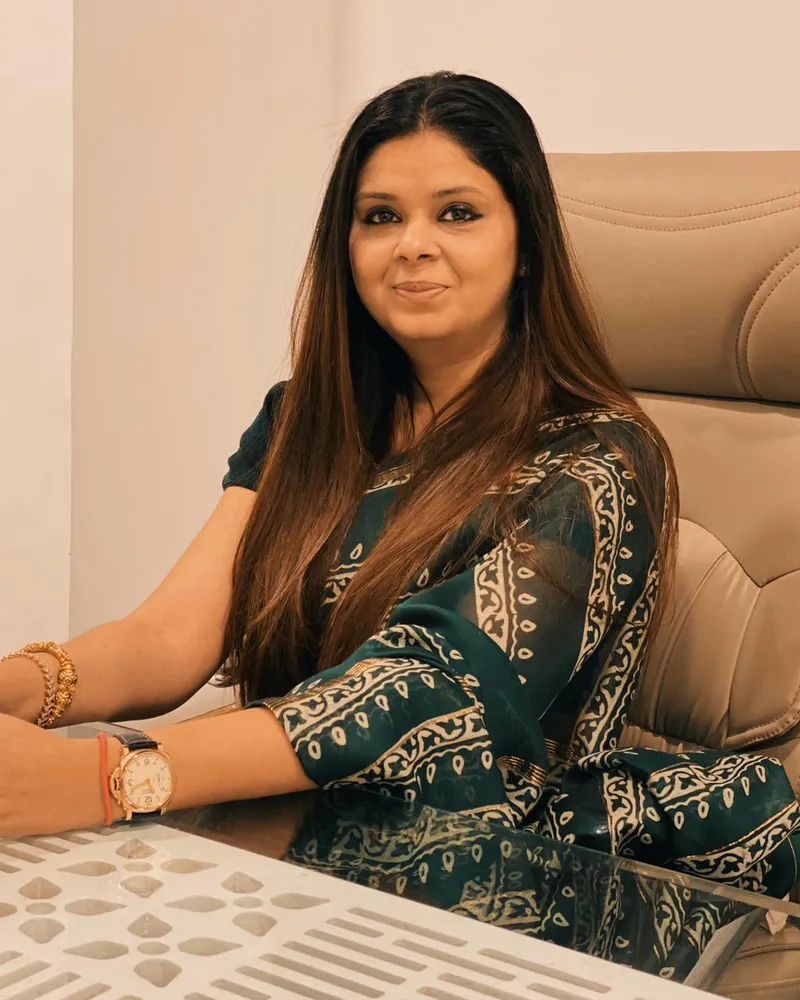Her sister’s failed IVF attempts led this doctor to set up an IVF chain in Tier II and III India
Dr Gauri Agarwal is the Founder of Genestrings Diagnostics Centre, a private genetic testing facility in Delhi-NCR, and Seeds of Innocence, a bootstrapped IVF chain that is focusing on Tier II and III India.
Her sister’s failure to conceive inspired Dr Gauri Agarwal to study medicine and go on to launch an IVF and genetic diagnostics centre.
Born in a middle-class family in Kanpur, Gauri says it was her father’s dream that “I become a doctor”. Both parents encouraged Gauri and her two siblings, a sister and brother, to pursue the best education.
But Gauri’s inspiration lay elsewhere.
“When I was 15, I decided to pursue medicine, especially embryology and reproductive medicine. I had seen my sister disheartened after five failed IVF attempts. She went to Mumbai as IVF was not popular or available in smaller towns like Kanpur. She finally conceived through IVF when I was in Class 11, but unfortunately suffered from ovarian hyper-stimulation syndrome (OHSS).
"Her experiences made me wonder about the gaps in the process that can cause such pain, both physical and mental. I also wondered why she had to travel all the way from Kanpur to Mumbai for the process,” Gauri recalls.
She completed her MBBS course from Bharati Vidyapeeth University, Pune. Post her DNB from Coimbatore, she wanted to academically enhance her skills and trained in embryology and reproductive medicine at National University, Singapore, and University of Ghent, Belgium.
Gauri got married soon after completing her MBBS course, but says she was lucky to “be married into a family of reputed doctors”.
“They not only encouraged me as I got my DNB and international fellowships, but also supported my dream of setting up my own chain of IVF clinics. My husband, Dr Rajat Arora, inspired me to take it a step ahead and pursue courses in embryology in Singapore and a fellowship in assisted reproductive techniques in Belgium. My parents-in-law, both established doctors, started the Yashoda Group of Hospitals in Ghaziabad 35 years ago.”
It was an obvious choice to set up her first IVF centre in the hospital premises. However, Gauri was determined not to take the support for granted and decided to start small and understand the market.
Gauri began with health camps in adjoining rural areas of Dadri and Loni where IVF was an alien concept.
She went on to launch Seeds of Innocence, a bootstrapped IVF chain that started with one centre in 2015 in Delhi's Malviya Nagar.
“My initial earnings from the few cases were used in developing promotional material and advertising etc. Eventually, I was doing an average of 40+ cycles in a month, which was a huge number,” she says. She pumped back all profits to grow the business.
In 2017, she, then mother to a four-year-old boy, started an IVF unit in Ghaziabad. While there were concerns about her ability to run an independent venture, Gauri was keen to establish her business. People in Ghaziabad and adjoining areas were not much aware of the term IVF; it had and still has a huge opportunity in the Tier III market.

“Around the same time, I became pregnant with my second child. Patients were apprehensive, but I persisted as they trusted me. We were doing 50 cycles for the first time after nine months; I couldn’t have given up then. I ensured that the patients get the best embryologist from Delhi, so I had to start my day at 5 am as that was the only time he could spare. Looking at patient loyalty and results, I leased the current space in Delhi in March 2016; I was due to deliver in April,” Gauri recollects.
She terms this one of the most challenging times of her life. “Even on the day of my delivery, I had three pick-ups, went straight to the labour room, and was back at work in three days.”
Gauri believes that her work helped her survive postpartum depression and that her “family and husband were supportive after they witnessed the blessings she got from happy patients”.
Today, there are over 10+ centres across 10 states in India - two in Delhi, one each in Ghaziabad and Meerut in Uttar Pradesh, Faridabad in Haryana, and the others in Patna, Bihar; Ranchi, Jharkhand; and Haridwar, Uttarakhand.
Starting the genetics facility
It was during the early days of Seeds of Innocence that the idea of Genestrings was born.
Gauri recalls that in 2015, in one of her early cases, the foetus was diagnosed with a severe condition at 13 weeks.
“The worst part is that the woman had taken a loan for the IVF process. That was the turning point; it prompted me to combine advanced reproductive genetics with IVF. Seeds of Innocence was the first IVF clinic in India to set up an in-house genetic testing lab; other IVF centres were then sending samples to Belgium and Spain. This facility later became a separate entity: Genestrings,” she says.
She says setting up the genetics wing was challenging due to the huge investment. “Trained manpower was also quite expensive. We pushed further in Tier II and III cities to be able to set up bootstrapped entities.”
Genestrings Diagnostics Centre now does every kind of genetic testing – sanger sequencing, non-invasive prenatal testing (NIPT), etc.
Recognised by the Department of Scientific and Industrial Research, Government of India, it is an ICMR-recognised Centre of Excellence for autism-related research and is working on a gene panel specific to the Indian population.
The COVID shift
The COVID-19 pandemic led to a major shift. IVF was declared non-essential medical service and patients undergoing treatment were left in lurch -- they risked losing both a chance to become parents and the money.
“A lot of them didn’t have time - females with advanced age were losing their eggs with each passing day. We ensured continuity of treatment by sending nurses/injections home. We had to ensure the safety of surrogates, even though they were taken care of by agencies. We ensured that there were no major salary cuts in the organisation and no one lost their job,” Gauri says.
Realising the need of the hour, they decided to pivot the business towards RT-PCR testing, and quickly aligned the team for an NABL audit and ICMR certification.
“I realised we have the potential to utilise our capability for COVID testing. We quickly got recognised by ICMR and empanelled ourselves with the Delhi Government. A few months later, we approached GMR and proposed setting up India’s first full-fledged test-on-arrival laboratory; this started operations in September 2021.”
Gauri says she had foreseen that this would become key to eventually open international borders, adding that the Genestrings laboratory at the Indira Gandhi International Airport was the first to give results in four hours at a time when even Dubai airport was delivering reports in 24 hours.
"We also launched a pathology reference lab in Delhi to facilitate access to testing during the second wave this year,” she says.
Revenue and the future
Gauri had ensured that Seeds of Innocence did not become a single-doctor brand. This helped as each centre is modelled as a self-sustainable entity with required and relevant clinical experts. The team initially focused on ensuring a strong base and establishing growth blueprint rather than fast-paced funded growth.
Each unit was built using revenues from existing ones and were typically cash-flow positive from the first month due to proper planning and pre-launch activities. A typical project breakeven is achieved by the end of the second quarter, if all goes well, she says.
Typical capex for a new IVF centre is anything between Rs 2-2.5 crore with another Rs 30-50 lakh set aside for initial branding, and other fixed opex. On an average, each standalone unit did about Rs 4-6 crore of top line revenue per annum, in the pre-COVID era, she says.
The team a revenue of Rs 18 crore in FY21, a dip of 25 percent over the last financial year, as IVF units were shut. The Ranchi unit was launched in the initial phase of the pandemic in March 2020 and two new units were launched in Q1FY22.
Seeds of Innocence now has 13 centres across eight states.
Genestrings, on the other hand, benefited from the timely pivot and expansion amid the pandemic and closed at above Rs 65 crore. It grew from a 10-member team in FY20 to well over 250 at the moment and is still growing.
“Diagnostics will certainly remain a major focus in the coming months and years -- both COVID and non-COVID diagnostics services will be our area of operations. We are open to a public-private partnership model, in diagnostics and IVF, with government institutions. Seeds of Innocence is also expanding in international markets -- we are opening centres in Nigeria and Oman this year. We would also like to initiate research, especially in the field of genome sequencing,” Gauri says.
Edited by Teja Lele



![[100 Emerging Women Leaders] Meet Pooja Goyal, the serial entrepreneur whose bootstrapped edtech startup found success](https://images.yourstory.com/cs/4/a9efa9c02dd911e9adc52d913c55075e/100EwLeaders-Pooja-1630463647523.png?fm=png&auto=format&h=100&w=100&crop=entropy&fit=crop)
![[100 Emerging Women Leaders] How this mother decided to help solve for the diaper rash problem with D2C babycare brand SuperBottoms](https://images.yourstory.com/cs/4/a9efa9c02dd911e9adc52d913c55075e/Pallavi-Utagi-1630300452396.png?fm=png&auto=format&h=100&w=100&crop=entropy&fit=crop)
![[100 Emerging Women Leaders] Launched from home, these sisters' D2C startup has attracted celebs like Anushka Sharma, Taapsee Pannu](https://images.yourstory.com/cs/4/a9efa9c02dd911e9adc52d913c55075e/100EmergingWomen-AartiandAkankshaChhabra-01-01-1630044755165.png?fm=png&auto=format&h=100&w=100&crop=entropy&fit=crop)




